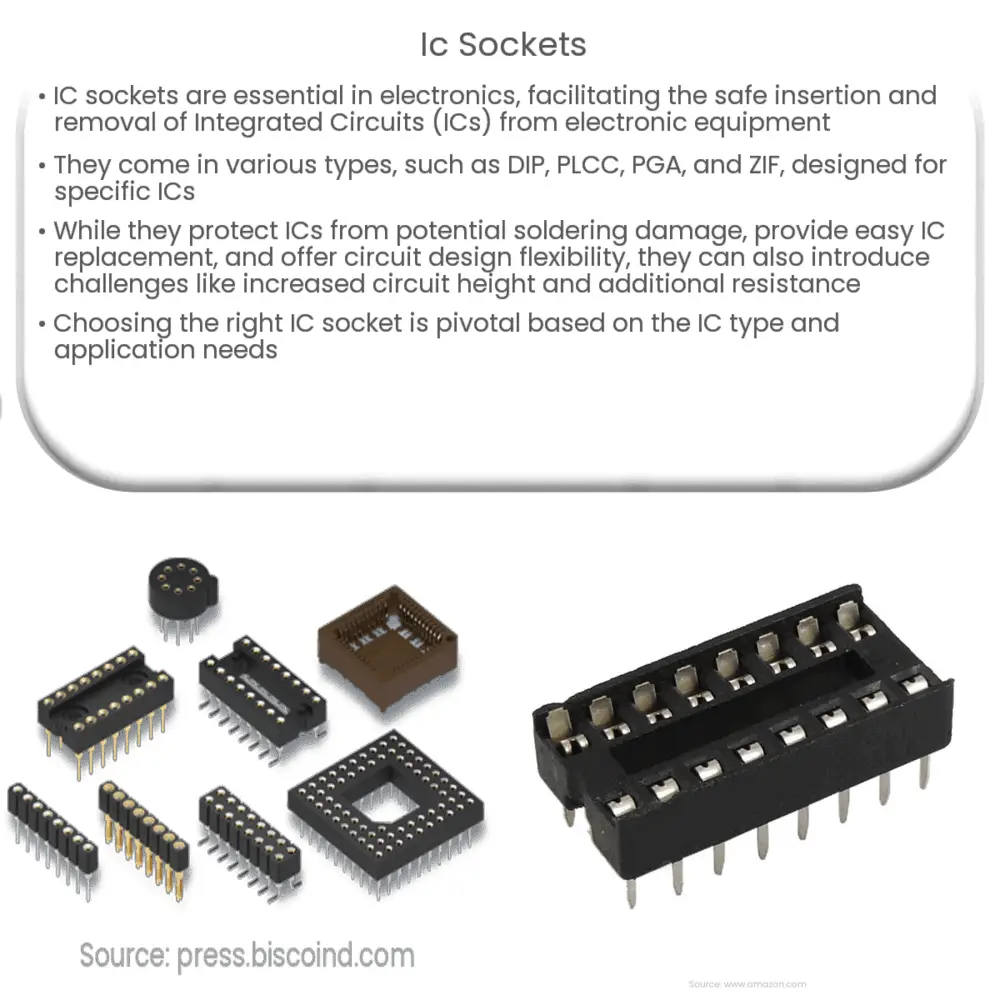Explore the world of IC Sockets, their types, importance in electronics, advantages, drawbacks, and tips for choosing the right one.

Understanding IC Sockets: An Essential Component in Electronics
An IC socket, also known as an Integrated Circuit socket, plays a crucial role in the realm of electronics. It’s a device created to contain and support ICs (Integrated Circuits), which are essentially miniature circuits printed on a semiconducting material. The prime purpose of IC sockets is to facilitate the safe insertion and removal of ICs in electronic equipment or a printed circuit board (PCB) without causing damage to the IC or the board.
Types of IC Sockets
IC sockets come in different shapes and sizes, each designed for a specific purpose or type of IC. They are categorized based on the number of pins, the arrangement of pins, and the materials used. Here are some common types:
- Dual In-line Package (DIP) Sockets: DIP sockets are the most common type. They consist of two parallel rows of pins and are suitable for DIP ICs.
- Plastic Leaded Chip Carrier (PLCC) Sockets: PLCC sockets are square-shaped and have pins on all four sides. They are designed for PLCC ICs.
- Pin Grid Array (PGA) Sockets: PGA sockets have a grid-like arrangement of pins. They’re used mainly for microprocessors.
- Zero Insertion Force (ZIF) Sockets: ZIF sockets use a lever to insert and remove the IC without any force, making them ideal for situations where frequent IC swapping is necessary.
The Importance of IC Sockets in Circuit Design
While IC sockets might appear as simple connectors, their importance in electronics and circuit design is significant. These components ensure the safe installation of ICs, thereby protecting them from potential damage during the soldering process. ICs are often sensitive to heat, and direct soldering onto the PCB can cause them to malfunction or degrade over time. The use of an IC socket, in this case, proves beneficial.
Other Advantages of Using IC Sockets
IC sockets offer several advantages beyond protection from heat. These include:
- Easy IC Replacement: When an IC fails, the presence of a socket allows for easy replacement without the need to unsolder and resolder a new IC onto the board.
- Flexibility: IC sockets provide flexibility for experimenting with different ICs in prototype circuits. The IC can be swapped out easily with no risk to the surrounding circuitry or the IC itself.
To be continued…
IC Socket Materials and Quality
IC sockets are typically made from a variety of materials, including plastic for the body and metal for the contacts. The quality of these materials directly influences the performance and reliability of the socket. High-quality IC sockets usually feature gold or tin-plated contacts to ensure good conductivity and resistance to corrosion.
Drawbacks of IC Sockets
While IC sockets have their advantages, there are also some drawbacks. Here are a few to consider:
- Increased Circuit Height: The addition of a socket increases the overall height of a circuit, which may not be ideal for all applications, particularly those requiring compact assemblies.
- Additional Resistance: Sockets can introduce a small amount of resistance into the circuit, which may affect the performance of high-speed or high-frequency circuits.
- Cost: Sockets increase the cost of an assembly because they are additional components that need to be purchased and installed.
Choosing the Right IC Socket
Choosing the right IC socket depends on several factors, including the type of IC, the application, the required durability, and cost considerations. It’s crucial to consider these factors to ensure that the IC socket fulfills its intended function while maintaining the overall performance and integrity of the circuit.
Conclusion
In summary, IC sockets serve a critical function in the field of electronics, providing protection for ICs during installation, making IC replacement easier, and offering flexibility in circuit design. While they do present some disadvantages such as increased circuit height and additional resistance, their benefits often outweigh these drawbacks. Selecting the right IC socket is therefore crucial, depending on the application, the IC type, and other relevant considerations. As electronics continue to evolve, the importance of understanding and properly utilizing IC sockets will remain significant for both professionals and hobbyists in the field.

